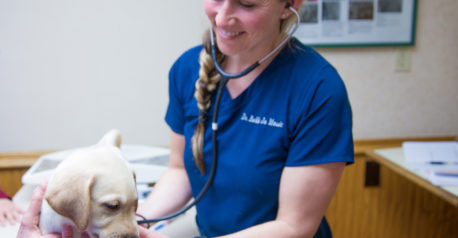24-Hour Emergency Care
IF YOUR PET HAS SUFFERED A SUDDEN TRAUMA, or is experiencing a life threatening emergency,
PLEASE CALL US IMMEDIATELY! 406-252-9499
If your pet has suffered an accident or is experiencing life-threatening symptoms, please call us immediately. No matter what the incident, or at what time, if your dog or cat needs urgent medical attention from a vet, the Animal Clinic of Billings is on standby to assist.
Our vets provide 24/7/365 emergency veterinary care services for your pet to help you and your companion through any medical emergency that may occur.
Whatever the problem may be, our veterinarians and support staff have you covered. The Animal Clinic of Billings is proud to provide the best veterinary care and emergency services available in and around the greater Billings area, and our veterinary surgeons offer surgical solutions and management options for treating practically any solvable medical condition.
Call Our 24-hour Answering Service
Although the Animal Clinic of Billings and Animal Surgery Clinic is a full-service 24-hour emergency veterinary hospital, a veterinarian is not always on site after regular business hours and may need to come meet you if the emergency calls for it. This is why it’s imperative you call our answering service first before you leave.
This brief call to explain what’s happening will help our on-call veterinarian understand the type of emergency and establish if emergency medical attention is in-fact necessary.
Often, the situations aren’t as bad as you think and our 24-hour answering service can save you a trip to our hospital in the middle of the night. If our emergency veterinarian decides immediate medical attention is needed, the short phone call beforehand allows us to start preparing the necessary materials and veterinary assistants needed to complete the emergency procedure before you get to the hospital.
WHEN TO SEEK EMERGENCY VETERINARY CARE
It can be hard to know whether a pet’s problem is an emergency that requires urgent veterinary care or not. The following guidelines should help you determine if you need to seek out emergency care for your pet.
Medical emergencies that require immediate veterinary intervention include:
- Difficulty breathing
- Acute abdominal swelling
- Electric shock
- Intractable vomiting or bloody vomit
- Abnormal or significant bleeding
- Abnormal vomiting or diarrhea
- Bloody diarrhea
- Seizures
- Collapse
- Loss of consciousness
- Trauma: bite wounds, vehicle collision, fall from a height, etc.
- High or low temperature (more than 104 or less than 100 degrees)
- Inability to urinate or defecate
- Rattlesnake bite
- Burns and/or smoke inhalation
- Unable to urinate or defecate
- Exhibits symptoms of heat stroke
- Punctures, cuts and bite wounds
Our veterinary hospital is equipped with a state-of-the-art surgical suite and diagnostic and monitoring equipment to allow us to provide your dog with the best possible emergency care when it matters most. We do not require an appointment for emergencies or urgent care for critically injured or sick pets. Our emergency veterinarians are trained to receive patients and stabilize them as quickly as possible.
Our experienced veterinary team can increase the odds of recovery for your beloved friend, even in difficult emergency care situations.
We take a proactive approach to protect the lives of loved ones and your feline companions. At the Animal Clinic of Billings, our veterinarians and support staff understand the stress and panic that occurs during a medical emergency, which is why we work diligently to receive and treat your pet as soon as possible.
We accept emergencies at any time during our regular office hours. After hours emergencies are responded to by one of our trained emergency veterinarian who is on-call at all times. Please call us ahead of time at 406-252-9499 so our team can be prepared to meet you and provide treatment.
WHAT TO DO IN CASE OF AN EMERGENCY
If you’re unsure how severe your pet’s condition might be, and it’s during regular business hours, we recommend you bring them straight to our emergency clinic. If it’s not during regular business hours, please call our answering service immediately for instructions on what to do. No matter what the incident, or at what time, if urgent care is required, the Animal Clinic of Billings is ready to assist.
During a medical emergency, it is essential to remain calm so that you can do everything possible to help your pet safely and efficiently. If a friend or family member is available, have them drive while you focus on comforting your pet. We understand that emergencies are very stressful, but panicked behavior can further agitate an already stressed pet, potentially worsening their condition; maintaining a relaxed and calm attitude will help to put your pet at ease.
Emergencies are never convenient and often lead caring pet owners to feel panicked and overwhelmed. At the Animal Clinic of Billings, our emergency veterinarians understand what you are going through, which is why we offer 24-hour emergency vet care to our Billings area residents and work diligently to receive and treat your dog as soon as possible.
TRANSPORTING YOUR PET
Although you have a special bond with your pet, during an illness or injury, a cat or dog’s instincts may result in aggression toward anyone attempting to handle them. If you have an emergency that requires transportation to an emergency hospital, please take the proper steps to ensure that your pet, as well as its human handlers, will not suffer from any subsequent injuries.
Once your pet is secured in the vehicle, immediately drive to the emergency clinic or veterinary hospital.
PROVIDING FIRST AID TREATMENT ON YOUR PET
Sometimes, first aid is necessary to stabilize your cat before transporting them to an emergency cat clinic. In addition, cat emergency care can be performed at home to stave off an emergency trip to a cat hospital.
First aid treatments include:
- For external bleeding due to trauma, elevate the affected area, and apply direct pressure to the wound. Make a tourniquet to isolate the cats affected limb. Use a towel to apply pressure to the areas of your cat that are actively bleeding.
- For choking emergencies, put your fingers in your cat’s mouth and try to remove the blockage. Take care to not push the blockage further back into the cats throat, and mind your fingers to ensure they do not get bitten.
If you cannot remove the object, you must perform a modified Heimlich maneuver by giving a sharp rap to your cat’s chest. This should dislodge the object. To minimize the risk of injury in an actual emergency, we recommend you learn how to execute this maneuver beforehand.
PERFORMING CPR ON YOUR PET
CPR is an essential skill that every person should know how to administer. Emergencies are never planned or convenient. Time is of the essence, and employing simple life-saving techniques means the difference between life and death.
Like humans, an animal’s heart and lungs are the two most critical body functions. If your pet can’t breathe, or if he or she does not have a heartbeat, CPR is in order.
If an emergency such as this occurs, please take the following steps:
- First, check your pet to see if it’s breathing.
- If your pet is not breathing, place them on their side and begin artificial respiration by extending the head and neck, and hold the jaws closed and blow into the nostrils once every three seconds. Ensure no air is escaping between your mouth and the nose.
- If there is no heartbeat, incorporate cardiac massage while administering artificial respiration by applying three quick, firm chest compression for every breath until your pet is breathing on his or her own.
Keep in mind that because each moment without oxygen results in a grim recovery prognosis, performing CPR on your pet can significantly increase the chances for a better recovery and an enhanced quality of life.
WHAT TO DO IF YOUR PET EATS SOMETHING POISONOUS
If your pet ingests a toxic substance, or if you suspect he or she has, seek emergency care immediately. Go directly to the veterinarian or emergency veterinary hospital. Bring the bottle of medication or poison your pet ingested whenever possible. Call the veterinary hospital on your way or beforehand if it’s out of regular business hours and tell them what your pet swallowed or ate, how long ago it was eaten, and how much was ingested.
FINDING THE NEAREST EMERGENCY CLINIC
If you don’t have seconds to spare during an emergency, please bring your pet immediately to us or an emergency veterinary clinic. If the crisis isn’t during regular business hours, please call our answering service before leaving at: 406-252-9499
By calling us first, our emergency veterinarian can assess the severity of your emergency and get to the clinic faster to begin preparing for your arrival if the situation calls for immediate medical attention.
In all critical care emergencies, the most important thing is to get your pet to our veterinarian as soon as possible and let us handle the rest.



